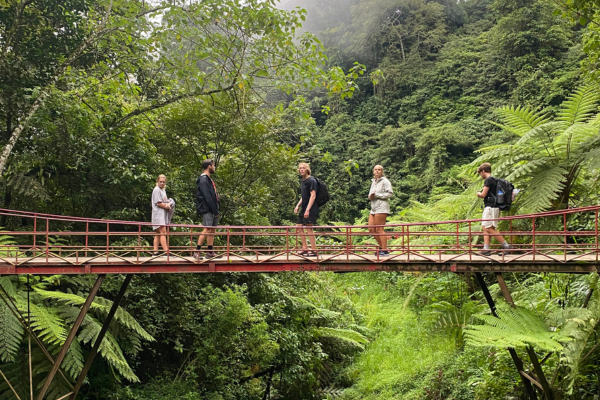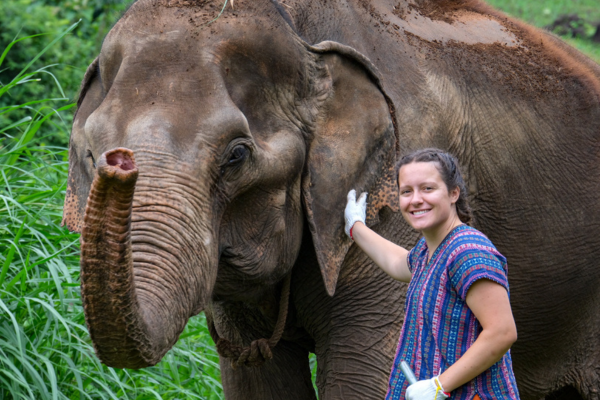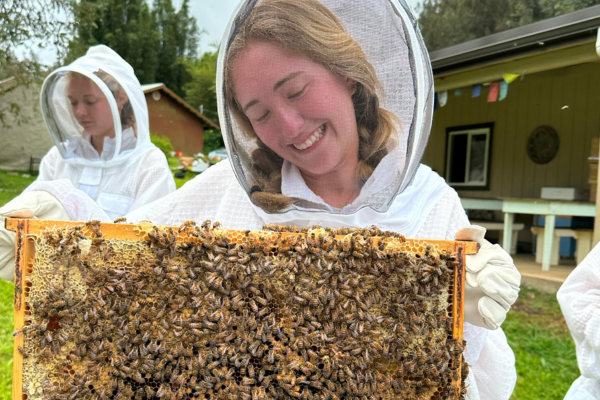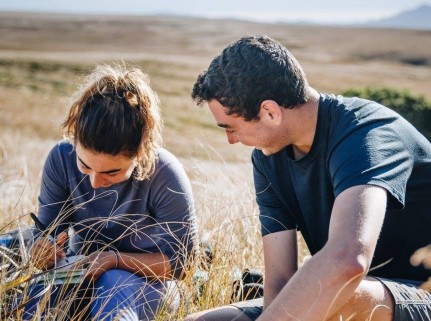Many gap year programs involve an element of service learning. In a world full of greenwashing and voluntourism, it is more important than ever to ask the question, how does service learning benefit the communities they operate in?
Service learning is a unique approach that combines community service with experiential learning. Examples undertaken by students are: habitat restoration and species monitoring; assisting local students with English-language development; and improving school environments in poor rural communities. If done correctly, it allows participants to really immerse themselves in a place and share an experience with local people, bridging the gap that often exists between visitor and host. At Pacific Discovery, we work hard to ensure that the work our groups do is grounded in community needs, vision and are executed through local leadership.
In this blog, we will delve into some of the ways in which service learning benefits local communities during a gap year and give examples of some of our service learning projects on programs.
Benefits for Local Communities
1. Addressing Local Needs
Local communities often face challenges that require collective efforts for solutions. Service learning projects can be tailored to address these specific needs, such as education, healthcare, environmental conservation, or poverty alleviation. Participants contribute their time, skills, and energy to create tangible changes that directly impact the community.
2. Sustainable Development
Many service learning projects focus on sustainability and long-term impact. Whether it's setting up recycling programs, creating community gardens, or teaching vocational skills, these initiatives contribute to the overall well-being of the community for years to come.
Service Learning Spotlight
Friends of the National Parks Foundation | Australia and Bali Gap Semester Program

On our Australia and Bali Gap Semester Program, we participate in some amazing service-learning projects. On week 10, we work with an organization called Friends of the National Parks Foundation (FNPF) that manages holistic conservation and community development programs on the Balinese Hindu island. They'll teach us about the Bali starling conservation work being done on the island, build nests, weave baskets, and give our time helping out amongst the local communities that call this island home.
Friends of the National Parks Foundation (FNPF) projects have been recognized globally by organizations such as the United Nations Development Programme, the Whitley Fund for Nature and the Rainforest Action Network.
Learn more about Friends of the National Parks Foundation here.
Happy Elephant Home | Southeast Asia Gap Semester Program

In Thailand (on our Southeast Asia Gap Semester program), we will be staying at an ethical elephant conservation park that aims to solve some of the problems surrounding elephant exploitation in Thailand. Despite a ban on logging, elephant habitat is still being lost and as few as 500 wild elephants are left within Thailand and they are threatened. Over 2,000 domestic elephants, trapped in the traditional elephant tourist industry, have a bleak future. We will be up close and personal with these kind and unforgettable animals for a few days, helping care for them and exploring the complex issue the animal conservation world is currently facing.
Learn more about Happy Elephant Home here.
Big Island Farm | Hawaii Mini Semester

On our Hawaii Mini Semester, we’ll spend some time at the amazing permaculture farm, Big Island Farms and learn about the local area’s farming techniques and the medicinal properties of plants. We will also use some of the vegetables and nutrient-rich ingredients that we harvest on the farm to create a delicious vegetarian meal for the group, while also learning about the importance of minimizing our carbon footprint and building relationships with local farmers.
Learn more about Big Island Farm here.
Service learning is a powerful tool that transforms a gap year into a period of personal growth, community impact, and global awareness. By engaging in service projects that address local needs, gap year participants not only contribute to the betterment of communities but also gain valuable life experiences that shape their future endeavors. The ripple effects of service learning go beyond the gap year itself, fostering a lifelong commitment to social responsibility and meaningful engagement with the world.
DISCOVER MORE
- The benefits of taking a gap year
- 12 cool gap year ideas for students
- How to take a gap year after high school
- What to do during a gap year in 2023
- How to take a gap year during college
- Why you should consider volunteering abroad on your gap year
- Everything you'll ever need to know about planning your gap year
- Should I take a gap year before medical school?
-

Leave a Comment
Your email address will not be published. Required fields are marked *